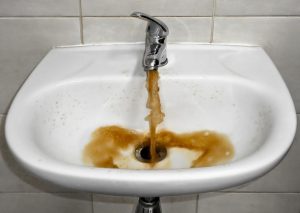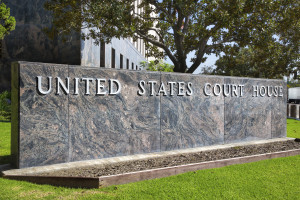 In a previous blog post, I mentioned how the Camp Lejeune litigation was starting to pick up. Specifically, the court scheduled a status conference to discuss pre-trial matters like protecting evidence and identifying witnesses. Even though we’re still in the early stages of litigation, a few things have happened since then that I’d like to discuss.
In a previous blog post, I mentioned how the Camp Lejeune litigation was starting to pick up. Specifically, the court scheduled a status conference to discuss pre-trial matters like protecting evidence and identifying witnesses. Even though we’re still in the early stages of litigation, a few things have happened since then that I’d like to discuss.
An Overview of the Camp Lejeune Lawsuits
The water at the U.S. Marine Corps Base Camp Lejeune (Camp Lejeune) is safe to drink and use. But it wasn’t always this way, especially during the decades before 1987. During that time, the water at Camp Lejeune contained various chemicals which could result in serious health problems.
Unfortunately, many of those harmed by the contaminated water had limited access to compensation for their injuries. This changed in August 2022 when President Biden signed the Camp Lejeune Justice Act of 2022 (CLJA).
This law removed government immunity that prevented victims of Camp Lejeune water contamination from suing the government. As a result, hundreds, if not thousands of lawsuits have been filed so far and it’s expected many thousands more will be filed over the next few years until the statute of limitation deadline passes.
With so many lawsuits filed in the same court (the CLJA requires all lawsuits to be filed in the U.S. District Court for the Eastern District of North Carolina), the court has understandably needed to make arrangements to best organize and process the incoming cases. This is where we see one of the most notable updates to the Camp Lejeune litigation.
Recent Updates to Camp Lejeune Litigation
 The most important update came on April 24, 2023, when the court created a Master Docket. This is a single docket for all Camp Lejeune water contamination cases, even if plaintiffs have their own cases that would otherwise get their own docket. The goal of the Master Docket is to streamline the early parts of litigation, such as filing pleadings and handling discovery.
The most important update came on April 24, 2023, when the court created a Master Docket. This is a single docket for all Camp Lejeune water contamination cases, even if plaintiffs have their own cases that would otherwise get their own docket. The goal of the Master Docket is to streamline the early parts of litigation, such as filing pleadings and handling discovery.
In a way, a Master Docket is a bit like an MDL, or multidistrict litigation. This is because the Master Docket makes it possible for the court to develop a master complaint and answer that most parties can use during the pleadings stage of litigation.
Once that’s complete, there’s a consolidated discovery process with each step outlined by the court. The court will also figure out when and how bellwether trials will take place and help coordinate settlement discussions among the parties.
The point of this consolidation is to speed up litigation, make it easier for the parties to reach a settlement and make it cheaper for each side to present their cases. But why isn’t the Camp Lejeune litigation an MDL? Well, it’s because all the cases are already being filed to the same court – the Eastern District of North Carolina. In contrast, an MDL is typically set up because many cases have been filed in various federal districts all over the country.
 The court has also ordered the creation of a leadership structure for the plaintiffs. One reason for this is so they can better coordinate their lawsuits with each other. Finally, the court has outlined the steps attorneys need to follow if they want to represent clients in one or more Camp Lejeune water contamination lawsuits in the Eastern District of North Carolina.
The court has also ordered the creation of a leadership structure for the plaintiffs. One reason for this is so they can better coordinate their lawsuits with each other. Finally, the court has outlined the steps attorneys need to follow if they want to represent clients in one or more Camp Lejeune water contamination lawsuits in the Eastern District of North Carolina.
It should also be noted that the court has granted a time extension to the U.S. government (the primary defendant in the Camp Lejeune water contamination cases) to file its answer to the plaintiffs’ complaints. This extension applies to many, if not most, pending cases.
This extension isn’t surprising given the relatively fluid nature of the overall litigation and how there’s some uncertainty in how the court will handle its massive caseload. But another source of uncertainty lies with the administrative claims.
Camp Lejeune Contaminated Water Administrative Claims
The CLJA requires plaintiffs to file an administrative claim with the U.S. Navy Judge Advocate General (JAG) before suing in court. The hope is that the JAG can process these claims and provide sufficient compensation to individuals so that they don’t need to go to court.
The problem is that few, if any, administrative claims have been processed. Not only that, but JAG still hasn’t set up its e-filing service to make it easier for the filing and processing of claims. Eventually, many of the administrative claims will be fully processed. When this happens, it’ll be curious to see the compensation offers that are made and what effect they will have on the Camp Lejeune litigation.
Proposed Law to Limit Attorney’s Fees in Camp Lejeune Cases
When the CLJA became law, it resulted in a massive amount of legal advertising. While much of this didn’t directly come from attorneys, it still left a bad taste for some people. For example, there was the perception that plaintiffs’ attorneys were trying to profit from the harm suffered by service members and their families.
In response, several members of Congress have tried to limit the amount of compensation plaintiffs’ attorneys in Camp Lejeune litigation can receive. The Protect Access to Justice for Veterans Act of 2023 introduced by Senator Durbin would limit an attorney’s fees to 20% of the money recovered within 180 days after filing an administrative claim and 33.3% of the money recovered from a civil suit. Another feature of this law is that only after clients have received their money from an administrative claim or lawsuit will their get attorneys paid.
In a more extreme approach, the Protect Camp Lejeune VETS Act introduced by Senator Sullivan would limit attorney’s fees to 2% of the money recovered for administrative claims where the client hired an attorney on or after August 10, 2022. This cap rises to 10% of the money recovered from civil suits or administrative claims where the client hired an attorney before August 10, 2022.
Like the Protect Access to Justice for Veterans Act of 2023, attorneys only get paid after their clients have received their money. Finally, the Protect Camp Lejeune VETS Act has a disclosure provision. This requires the reporting of attorney’s fees in Camp Lejeune cases to the court, the Attorney General and Congress.
What’s Up Next for Camp Lejeune Lawsuits
The court will help create a master complaint and answer, along with specifics on how to streamline discovery. The parties will complete the pleadings stage of the litigation and begin the discovery process. And hopefully, JAG will finish processing some administrative claims.
If you’d like to learn more about the Camp Lejeune lawsuits, stay tuned to this blog for more updates as they arise. In the meantime, if you have questions about a possible administrative claim or lawsuit due to water contamination from Camp Lejeune, you can call my direct line at 919.334.6277.
 North Carolina Product Liability Lawyer Blog
North Carolina Product Liability Lawyer Blog

